-
 Bitcoin
Bitcoin $120300
1.41% -
 Ethereum
Ethereum $4296
2.75% -
 XRP
XRP $3.220
1.46% -
 Tether USDt
Tether USDt $0.9997
-0.04% -
 BNB
BNB $801.6
0.14% -
 Solana
Solana $179.9
0.22% -
 USDC
USDC $0.9998
-0.01% -
 Dogecoin
Dogecoin $0.2302
-0.24% -
 TRON
TRON $0.3405
-0.39% -
 Cardano
Cardano $0.7965
0.53% -
 Hyperliquid
Hyperliquid $44.80
2.57% -
 Chainlink
Chainlink $21.95
2.94% -
 Stellar
Stellar $0.4438
1.68% -
 Sui
Sui $3.767
-1.42% -
 Bitcoin Cash
Bitcoin Cash $584.4
3.24% -
 Hedera
Hedera $0.2554
-0.59% -
 Ethena USDe
Ethena USDe $1.001
-0.02% -
 Avalanche
Avalanche $23.57
0.00% -
 Litecoin
Litecoin $126.6
4.64% -
 Toncoin
Toncoin $3.339
0.94% -
 UNUS SED LEO
UNUS SED LEO $9.001
-0.49% -
 Shiba Inu
Shiba Inu $0.00001320
-0.92% -
 Uniswap
Uniswap $10.84
3.36% -
 Polkadot
Polkadot $3.945
-1.39% -
 Cronos
Cronos $0.1663
4.77% -
 Ethena
Ethena $0.8136
8.48% -
 Dai
Dai $0.0000
0.00% -
 Bitget Token
Bitget Token $4.391
-0.51% -
 Monero
Monero $268.0
0.80% -
 Pepe
Pepe $0.00001169
-1.57%
What are synthetic assets?
Synthetic assets empower traders with increased accessibility, reduced fees, seamless 24/7 trading, and diversified portfolio options compared to traditional asset holdings.
Feb 22, 2025 at 05:25 am
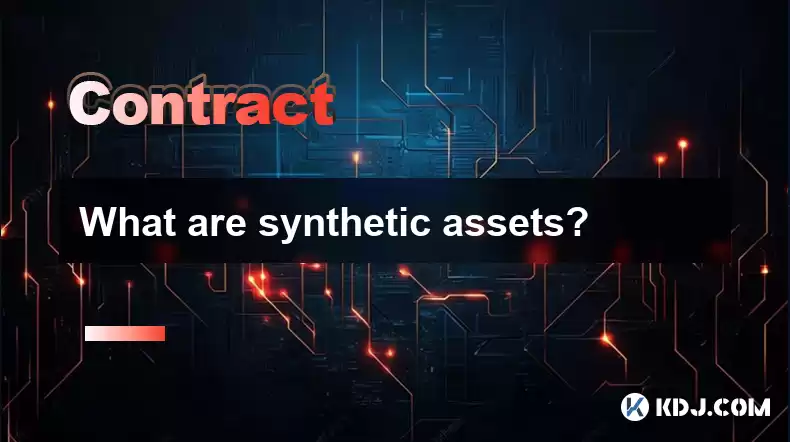
Key Points:
- Synthetic assets provide exposure to real-world assets without physical ownership or settlement risks.
- They are created on a blockchain platform, each representing a specific asset such as stocks, commodities, or precious metals.
- Synthetic assets offer advantages such as increased accessibility, reduced transaction costs, and seamless trading across different markets.
What are Synthetic Assets?
Synthetic assets are digital representations of real-world assets created and traded on a blockchain platform. They provide exposure to the underlying asset without the need for physical ownership, storage, or settlement. By tokenizing real-world assets on a blockchain, synthetic assets offer several advantages to traditional asset ownership:
- Increased Accessibility: Anyone with an internet connection can access and trade synthetic assets, regardless of geographical location or financial constraints.
- Reduced Transaction Costs: Synthetic asset transactions incur minimal fees compared to traditional asset transactions, which require intermediaries and brokerage commissions.
- Seamless Trading: Synthetic assets can be traded 24/7 on decentralized exchanges, enabling seamless and instant transactions across multiple markets.
- Diversification Opportunities: Synthetic assets allow investors to diversify their portfolios by gaining exposure to a wider range of assets not easily accessible through traditional methods.
Creation and Issuance of Synthetic Assets
- Smart Contract Creation: The first step is to create a smart contract that defines the terms, conditions, and mechanisms of the synthetic asset. This contract specifies the underlying asset, its ratio to the synthetic asset, and the parameters for creation and redemption.
- Collateralization: The next step is to collateralize the smart contract. Collateral may come from the issuer of the synthetic asset or through a combination of other synthetic assets and stablecoins.
- Asset Tokenization: The real-world asset is tokenized by creating digital tokens that represent ownership or exposure to it. These tokens are stored and managed on the blockchain.
- Linking to the Underlying Asset: Once the synthetic assets are tokenized, they are linked to the underlying asset's price through a price feed or an oracle. This ensures that the value of the synthetic assets accurately reflects the underlying asset's price in real-time.
Trading and Redemption of Synthetic Assets
- Trading: Synthetic assets can be traded like other cryptocurrencies on decentralized exchanges. Traders can speculate on the price movements of the underlying asset or engage in arbitrage opportunities between different exchanges.
- Redemption: The holder of a synthetic asset can redeem it for the underlying asset at any time. The redemption process is initiated by signing a request and providing proof of ownership. The synthetic asset is burnt, and the holder receives the underlying asset, adjusted for any fees or slippage.
FAQs:
- Q: What are the benefits of synthetic assets compared to traditional asset ownership?
- A: Increased accessibility, reduced transaction costs, seamless trading, and diversification opportunities.
- Q: Who issues synthetic assets?
- A: Synthetic assets can be issued by individuals, companies, or decentralized autonomous organizations (DAOs).
- Q: How are synthetic assets valued?
- A: Synthetic assets are typically linked to the price of the underlying asset through price feeds or oracles, ensuring that their value accurately reflects the underlying asset's price.
- Q: What are the risks associated with synthetic assets?
A: Synthetic assets carry risks such as:
- Smart contract vulnerabilities
- Price manipulation
- Lack of regulatory oversight
- Volatility of underlying asset prices
Disclaimer:info@kdj.com
The information provided is not trading advice. kdj.com does not assume any responsibility for any investments made based on the information provided in this article. Cryptocurrencies are highly volatile and it is highly recommended that you invest with caution after thorough research!
If you believe that the content used on this website infringes your copyright, please contact us immediately (info@kdj.com) and we will delete it promptly.
- DYDX Price Stays Afloat: Navigating Neutral Momentum with Technical Indicators
- 2025-08-11 20:50:12
- Superman Takes Flight: A Deep Dive into the Comic Program and Coin Medals
- 2025-08-11 20:30:12
- JasmyCoin's Bullish Momentum: Riding the Daily Gain Wave
- 2025-08-11 21:10:12
- Shiba Inu's Comeback Trail and the Meme Coin Mania: Can $SHIB Deliver a 12,000x Return?
- 2025-08-11 18:30:11
- Proof of Trust, Transparency, and User Safety: Keeping Crypto Real
- 2025-08-11 18:50:12
- Pudgy Penguins, Bitcoin Penguins, and the $22M Meme Coin Mania: A New York Perspective
- 2025-08-11 17:10:11
Related knowledge
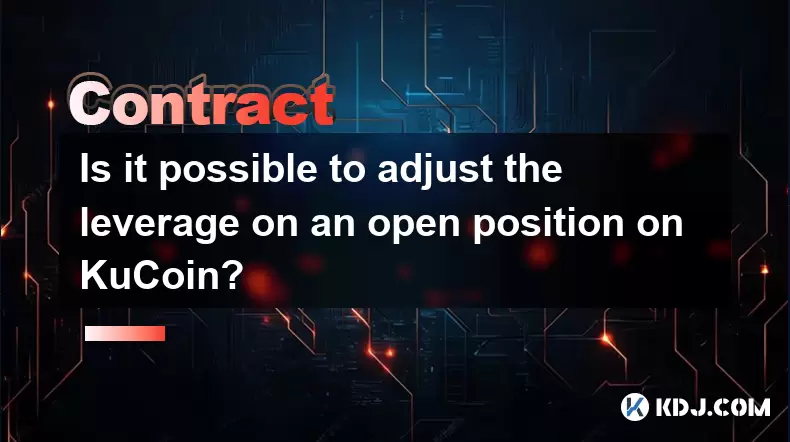
Is it possible to adjust the leverage on an open position on KuCoin?
Aug 09,2025 at 08:21pm
Understanding Leverage in KuCoin Futures TradingLeverage in KuCoin Futures allows traders to amplify their exposure to price movements by borrowing fu...

What cryptocurrencies are supported as collateral on KuCoin Futures?
Aug 11,2025 at 04:21am
Overview of KuCoin Futures and Collateral MechanismKuCoin Futures is a derivatives trading platform that allows users to trade perpetual and delivery ...
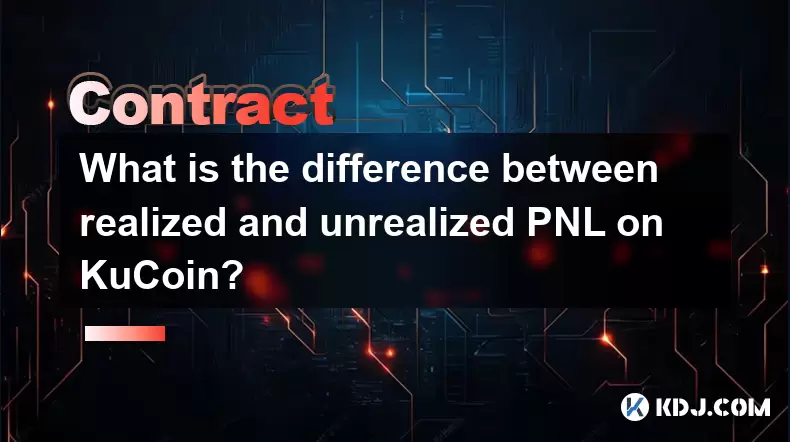
What is the difference between realized and unrealized PNL on KuCoin?
Aug 09,2025 at 01:49am
Understanding Realized and Unrealized PNL on KuCoinWhen trading on KuCoin, especially in futures and perpetual contracts, understanding the distinctio...

How does KuCoin Futures compare against Binance Futures in terms of features?
Aug 09,2025 at 03:22am
Trading Interface and User ExperienceThe trading interface is a critical component when comparing KuCoin Futures and Binance Futures, as it directly i...
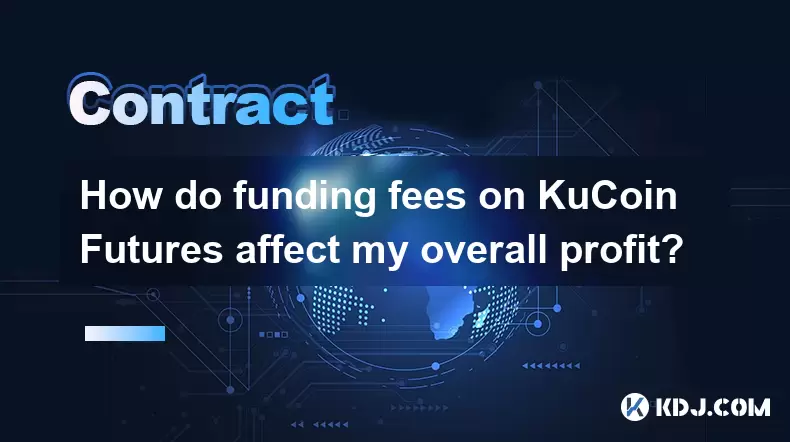
How do funding fees on KuCoin Futures affect my overall profit?
Aug 09,2025 at 08:22am
Understanding Funding Fees on KuCoin FuturesFunding fees on KuCoin Futures are periodic payments exchanged between long and short position holders to ...
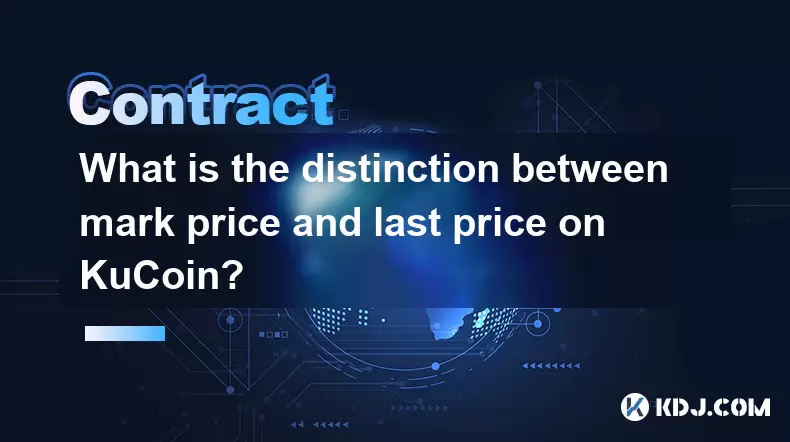
What is the distinction between mark price and last price on KuCoin?
Aug 08,2025 at 01:58pm
Understanding the Basics of Price in Cryptocurrency TradingIn cryptocurrency exchanges like KuCoin, two key price indicators frequently appear on trad...

Is it possible to adjust the leverage on an open position on KuCoin?
Aug 09,2025 at 08:21pm
Understanding Leverage in KuCoin Futures TradingLeverage in KuCoin Futures allows traders to amplify their exposure to price movements by borrowing fu...

What cryptocurrencies are supported as collateral on KuCoin Futures?
Aug 11,2025 at 04:21am
Overview of KuCoin Futures and Collateral MechanismKuCoin Futures is a derivatives trading platform that allows users to trade perpetual and delivery ...

What is the difference between realized and unrealized PNL on KuCoin?
Aug 09,2025 at 01:49am
Understanding Realized and Unrealized PNL on KuCoinWhen trading on KuCoin, especially in futures and perpetual contracts, understanding the distinctio...

How does KuCoin Futures compare against Binance Futures in terms of features?
Aug 09,2025 at 03:22am
Trading Interface and User ExperienceThe trading interface is a critical component when comparing KuCoin Futures and Binance Futures, as it directly i...

How do funding fees on KuCoin Futures affect my overall profit?
Aug 09,2025 at 08:22am
Understanding Funding Fees on KuCoin FuturesFunding fees on KuCoin Futures are periodic payments exchanged between long and short position holders to ...

What is the distinction between mark price and last price on KuCoin?
Aug 08,2025 at 01:58pm
Understanding the Basics of Price in Cryptocurrency TradingIn cryptocurrency exchanges like KuCoin, two key price indicators frequently appear on trad...
See all articles

























































































